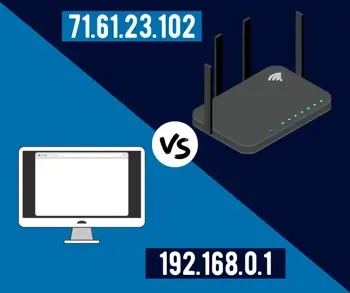Different IP Address on WhatIsMyIP.com Than IPCONFIG?
If I find my IP address, I'll see that it shows a different IP address than the ipconfig – ifconfig commands on my computer. You may find the same; this discrepancy can be confusing. However, in this article, we’ll explain why they might be different and how to determine your computer’s IP with certainty.
Understanding public and private IP addresses
There are two types of IP addresses: public IPs and private IPs. In simple terms, your public IP address, or external IP address, is part of a wide area network (WAN). It typically covers a large area, hence its name. For example, the Internet is considered a WAN.
On the other hand, a local area network (LAN) refers to your internal network, which mostly consists of private IP addresses within the computer network. You can connect many devices together within a LAN, all with private IPs. This allows them to communicate without Internet connectivity.

Why you see a different IP address on WhatIsMyIP than with ipconfig
The IP address shown on the WhatIsMyIP homepage is the public IP, or the external IP, of your connection, specifically the router or modem for your home network in most cases. It usually isn’t the IP of your computer or the specific device you’re checking the site on.
The Internet Protocol address shown with the ipconfig or ifconfig command, however, is the private IP assigned to that device specifically. Ipconfig does not give public IP; ipconfig gives private IP.
These private IPs commonly start with 192.186, 172.16, or 10.0.0, creating addresses like 192.186.4.1, 192.168.2.1, or 10.0.0.1, all of which are frequently used as private IPs. These IPv4 address internal blocks are reserved via Internet Assigned Numbers Authority (IANA), and not assigned as public or external IPs.
Neither IP is wrong; the results you get from our homepage and from your ipconfig-ifconfig commands are both your IPs. You don’t need to try to decipher which IP result is real when assessing WhatIsMyIP.com vs. ipconfig. There are different types of IP. From our homepage, you see your public IP; from your computer, you see your private IP.
Why is my public IP different from my router IP?
The IP system is vast. There are millions of devices in millions of local networks, all of which need IP addresses. Because of this, there are two kinds of IPs: private IPs on local area networks (LANs) and public IPs on wide area networks (WANs).
Your public IP is your router’s IP, so in most cases, your public IP is the same as your router IP. However, it’s possible for them to be different if your router is not connected to the Internet.
In this case, it would only be in use to provide a LAN for computers to communicate with each other. Therefore, it would display its local IP address, which is likely 192.168.1.1. That is the reason why your public IP may differ from your router IP.
The role of the router
Your residential modem or router acts as a DHCP server, assigning internal IPs to each device connected to the LAN. Therefore, all devices connected to your residential router on the LAN will share the same WAN IP. The WAN IP is the public IP address.
These public IPs are assigned to a modem or a router instead of directly to a computer in residential settings. Public IPs assigned directly to a computer’s network interface card (NIC) have protective measures in place via the installed operating system and any installed firewall software. However, because your router acts as a firewall to protect devices within your LAN from exposure to the public, it's much safer to use your router as the main connecting point.
Each internal device on your network receives a different private IP, assigned by the router or modem as it acts as a DHCP server.
You can determine if your computer is being assigned a public IP address through our website and the command prompt on your computer. You can also determine if you have a static IP address or a dynamic IP address assigned by your Internet service provider (ISP). But either way, don’t worry about the difference between your public IP and your private IP. Both are different in order for the IP system to function properly.